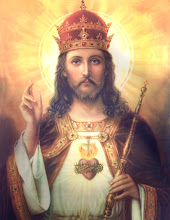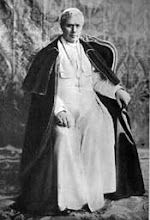Al gran novelista inglés, Evelyn Waugh, no le gustaban los cambios litúrgicos acontecidos tras el Vaticano II.
Extractamos aquí los siguientes párrafos del texto que acabamos de enlazar:
“The "bitter trial" was Waugh's reaction to the changes in the Church, especially in the Liturgy, stemming from Vatican II. Heenan seems to play the role of a sympathetic Prelate who listens to his famous countryman with patience but with little awareness that what Waugh feared would mostly come about. Waugh seeks to inform the British Prelate of the reactions of many an English Catholic, especially a convert like himself, of a sense of betrayal and a loss of dignity and beauty in the worship of the Church.
Waugh's last letter was to Lady Mosley, dated March 30, 1966, in which he told her frankly: "Easter used to mean so much to me. Before Pope John and his Council-they destroyed the beauty of the liturgy. I have not yet soaked myself in petrol and gone up in flames, but I now cling to the faith doggedly, without joy."
Waugh could be acid in his description of movements in the Church. "If the Mass is changed in form so as to emphasize its social character, many souls will find themselves put at a further distance from their true aim." Waugh thought that the liturgical changes were largely the product of the Germans-"I think it a great cheek of the Germans to try to teach the rest of the world anything about religion." Waugh could be biting: "The Mass is no longer the Holy Sacrifice but the Meal at which the priest is the waiter. The bishop, I suppose, is the head waiter."”
La verdad que ni a Waugh, ni a Tolkien ni a Agatha Christie, entre otros muchos, les hacía pizca de gracia estos cambios del Vaticano II, como bien dejaron claro en sus escritos y los manifiestos que firmaron. Los católicos ingleses, bien sensatos, se ponían del lado de la defensa dela Misa Tridentina en oposición a sus Obispos. No era ni la primera vez ni la última que los Obispos ingleses fracasaban. Recordemos que cuando la Reforma anglicana sólo hubo uno, St John Fischer, que se opuso a dicha Reforma. En los sesenta, y en los años posteriores, fue peor en Inglaterra: ni uno sólo se opuso a la revolución modernista.
Los Santos, en esta ocasión, habrá que encontrarlos entre los laicos, como fue el caso de Santo Tomás Moro.
Rafael Castela Santos
sexta-feira, junho 03, 2005
Waugh, el Vaticano II y la Nueva Misa
Publicada por
Rafael Castela Santos
à(s)
sexta-feira, junho 03, 2005

Enviar a mensagem por emailDê a sua opinião!Partilhar no XPartilhar no FacebookPartilhar no Pinterest
Subscrever:
Enviar feedback (Atom)
















0 comentários:
Enviar um comentário